Attached files
| file | filename |
|---|---|
| 8-K - FORM 8-K - KANSAS CITY SOUTHERN | ksu-20200623.htm |
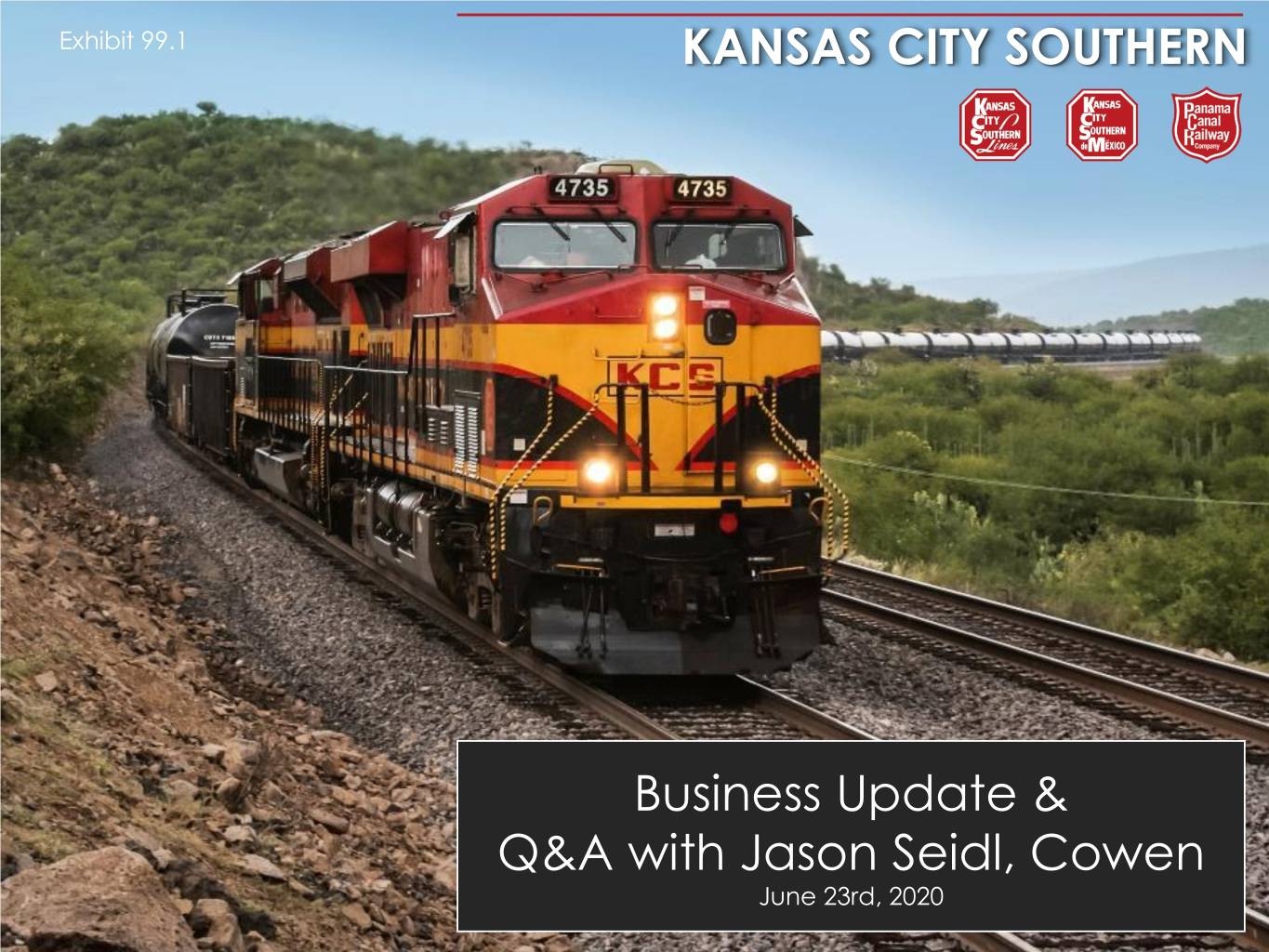
Exhibit 99.1 KANSAS CITY SOUTHERN Business Update & Q&A with Jason Seidl, Cowen KCS June 23rd, 2020
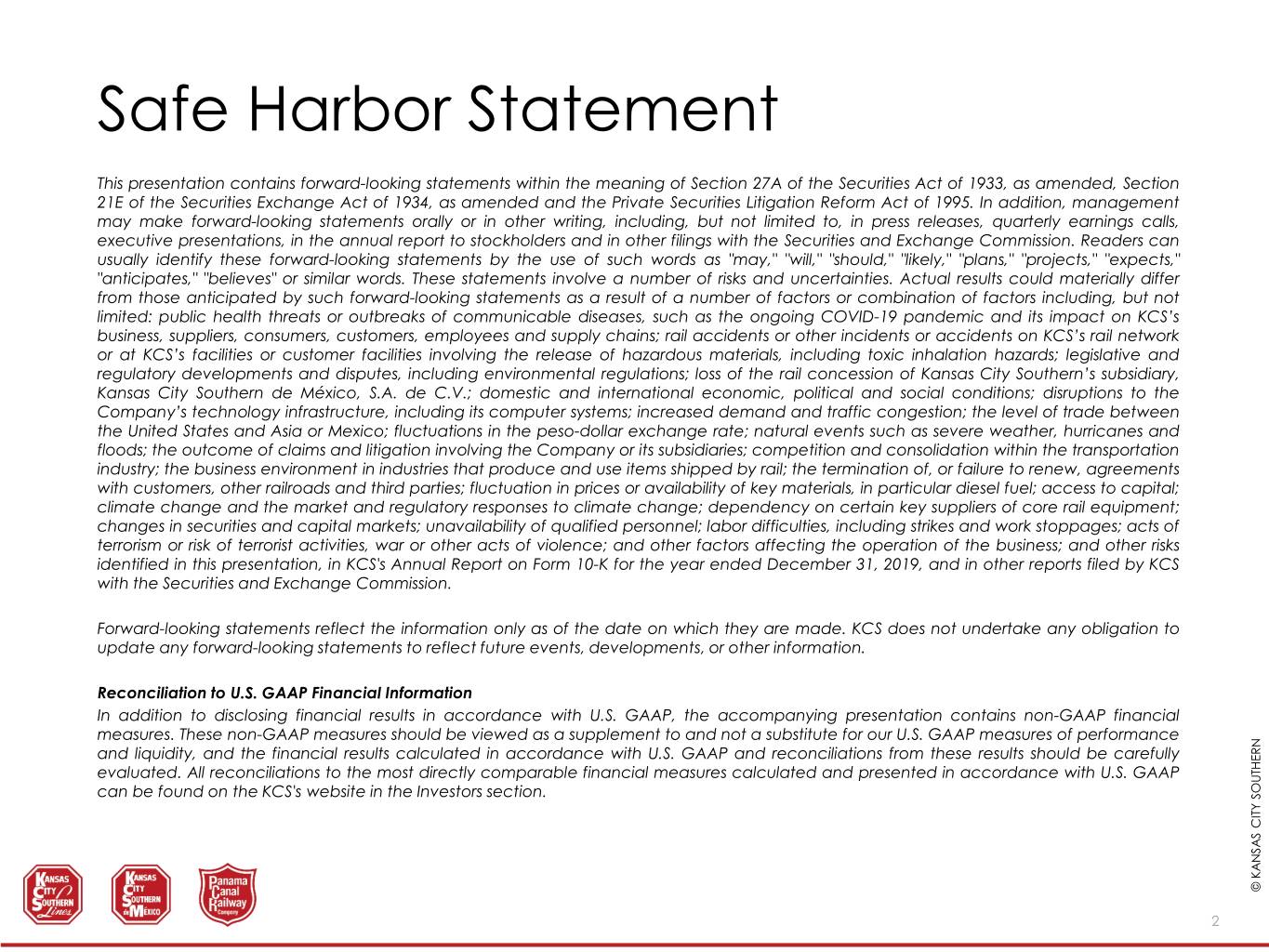
Safe Harbor Statement This presentation contains forward-looking statements within the meaning of Section 27A of the Securities Act of 1933, as amended, Section 21E of the Securities Exchange Act of 1934, as amended and the Private Securities Litigation Reform Act of 1995. In addition, management may make forward-looking statements orally or in other writing, including, but not limited to, in press releases, quarterly earnings calls, executive presentations, in the annual report to stockholders and in other filings with the Securities and Exchange Commission. Readers can usually identify these forward-looking statements by the use of such words as "may," "will," "should," "likely," "plans," "projects," "expects," "anticipates," "believes" or similar words. These statements involve a number of risks and uncertainties. Actual results could materially differ from those anticipated by such forward-looking statements as a result of a number of factors or combination of factors including, but not limited: public health threats or outbreaks of communicable diseases, such as the ongoing COVID-19 pandemic and its impact on KCS’s business, suppliers, consumers, customers, employees and supply chains; rail accidents or other incidents or accidents on KCS’s rail network or at KCS’s facilities or customer facilities involving the release of hazardous materials, including toxic inhalation hazards; legislative and regulatory developments and disputes, including environmental regulations; loss of the rail concession of Kansas City Southern’s subsidiary, Kansas City Southern de México, S.A. de C.V.; domestic and international economic, political and social conditions; disruptions to the Company’s technology infrastructure, including its computer systems; increased demand and traffic congestion; the level of trade between the United States and Asia or Mexico; fluctuations in the peso-dollar exchange rate; natural events such as severe weather, hurricanes and floods; the outcome of claims and litigation involving the Company or its subsidiaries; competition and consolidation within the transportation industry; the business environment in industries that produce and use items shipped by rail; the termination of, or failure to renew, agreements with customers, other railroads and third parties; fluctuation in prices or availability of key materials, in particular diesel fuel; access to capital; climate change and the market and regulatory responses to climate change; dependency on certain key suppliers of core rail equipment; changes in securities and capital markets; unavailability of qualified personnel; labor difficulties, including strikes and work stoppages; acts of terrorism or risk of terrorist activities, war or other acts of violence; and other factors affecting the operation of the business; and other risks identified in this presentation, in KCS's Annual Report on Form 10-K for the year ended December 31, 2019, and in other reports filed by KCS with the Securities and Exchange Commission. Forward-looking statements reflect the information only as of the date on which they are made. KCS does not undertake any obligation to update any forward-looking statements to reflect future events, developments, or other information. Reconciliation to U.S. GAAP Financial Information In addition to disclosing financial results in accordance with U.S. GAAP, the accompanying presentation contains non-GAAP financial measures. These non-GAAP measures should be viewed as a supplement to and not a substitute for our U.S. GAAP measures of performance and liquidity, and the financial results calculated in accordance with U.S. GAAP and reconciliations from these results should be carefully evaluated. All reconciliations to the most directly comparable financial measures calculated and presented in accordance with U.S. GAAP can be found on the KCS's website in the Investors section. © KANSAS © KANSAS CITY SOUTHERN KCS 2

Key Messages . Challenging Q2, but volumes are improving – QTD volume -23% and revenue -24% . PSR and active cost management producing excellent results – Absorbing new volume with minimal new train and crew starts – Record average train length – Recognizing operating & G&A efficiencies across the organization – Intense, company-wide focus on making structural efficiency gains as volumes return . Targeting $500M+ of Free Cash Flow* in 2020 Data shown through June 21, 2020 *Non-GAAP financial measure. The definition of this measure can be found on the KCS © KANSAS CITY SOUTHERN KCS website in the Investors section. 3

Q2TD Revenue by Business Unit Volume –23%; revenue –24%; FX adjusted revenue –22% Business Unit QTD Revenue Trend Least Agriculture & Strong shipments of Food Products; Grain has picked up slightly in June Affected Minerals Industrial & Weakness across most segments as uncertain economic Consumer conditions are driving lower demand Reduced demand due to widespread stay-at-home orders Chemical & Petroleum impacting Gasoline and LPG shipments to Mexico; June MTD refined products revenue and volumes are growing YoY Energy Low natural gas prices pressuring Utility Coal volumes; Crude Oil & Frac Sand weak due to low oil prices Magnitude of impact Intermodal Reduced consumer demand in U.S. & Mexico; automotive part exports to Mexico have to picked up sequentially in June Most Affected Automotive QTD revenue impacted by automotive plant outages; sequential improvement seen in June as plants reopen and slowly ramp up Path to Close Rightsizing operations Long-term growth Recovery coordination with to volumes; opportunities customers during prepared for unique to KCS downturn recovery franchise © KANSAS CITY SOUTHERN Data shownKCS through June 21, 2020 4

Carloads Have Improved by 31% Since Bottoming in Early May, but Remain (8%) Below Pre-COVID Levels Consolidated Weekly Carloads 45,000 43,000 (8%) 41,000 39,000 37,000 +31% 35,000 33,000 Weekly Carloads 31,000 29,000 27,000 25,000 Date Week Ended © KANSAS © KANSAS CITY SOUTHERN KCS 5
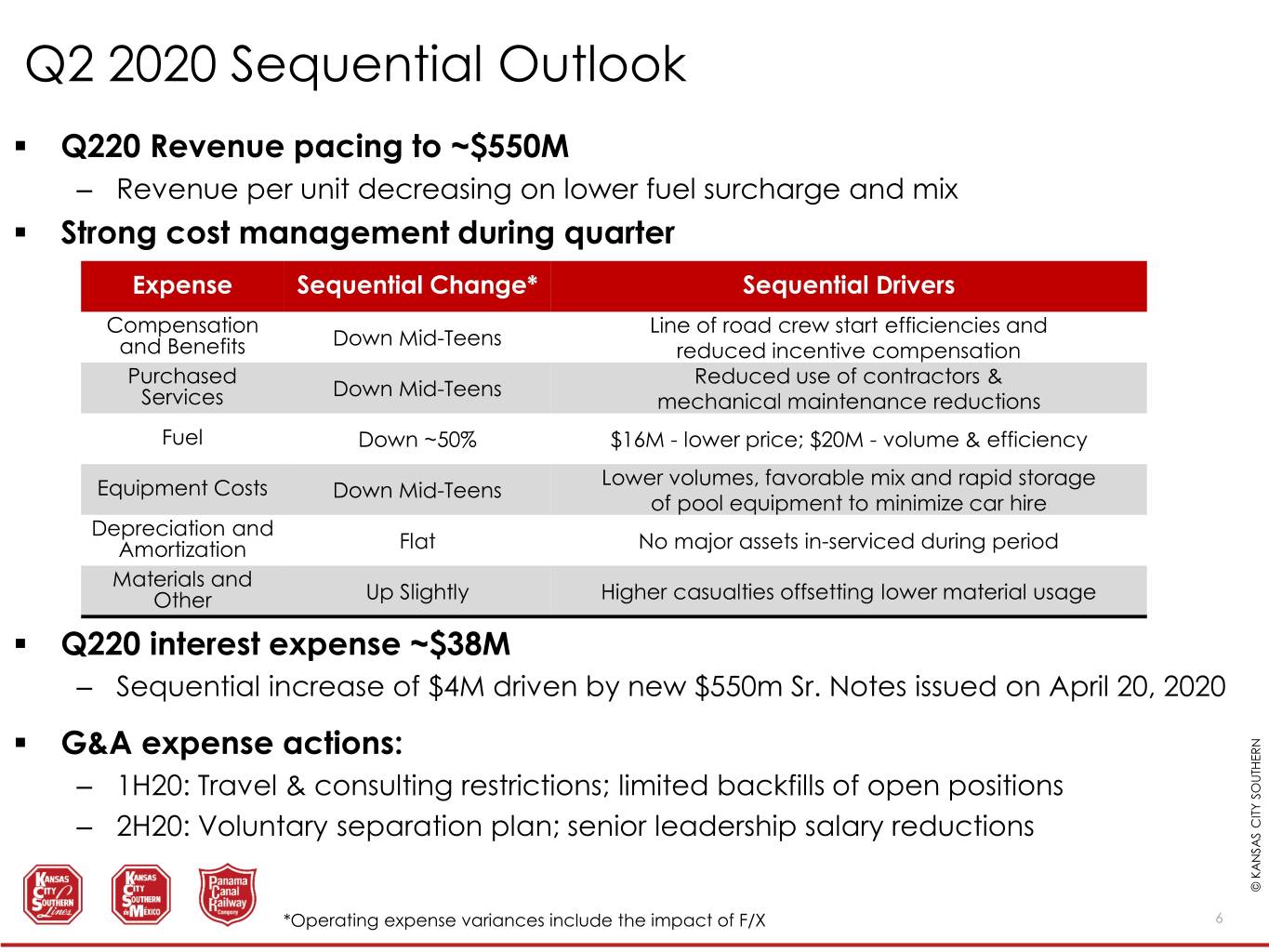
Q2 2020 Sequential Outlook . Q220 Revenue pacing to ~$550M – Revenue per unit decreasing on lower fuel surcharge and mix . Strong cost management during quarter Expense Sequential Change* Sequential Drivers Compensation Line of road crew start efficiencies and Down Mid-Teens and Benefits reduced incentive compensation Purchased Reduced use of contractors & Down Mid-Teens Services mechanical maintenance reductions Fuel Down ~50% $16M - lower price; $20M - volume & efficiency Lower volumes, favorable mix and rapid storage Equipment Costs Down Mid-Teens of pool equipment to minimize car hire Depreciation and Amortization Flat No major assets in-serviced during period Materials and Other Up Slightly Higher casualties offsetting lower material usage . Q220 interest expense ~$38M – Sequential increase of $4M driven by new $550m Sr. Notes issued on April 20, 2020 . G&A expense actions: – 1H20: Travel & consulting restrictions; limited backfills of open positions – 2H20: Voluntary separation plan; senior leadership salary reductions © KANSAS © KANSAS CITY SOUTHERN KCS *Operating expense variances include the impact of F/X 6

Actual Train Starts Pacing Well Below Pre-COVID Pro Forma Train Starts, Driving Efficiencies as Volumes Return 110 6,500 100 6,000 90 5,500 80 70 5,000 Train Length (in feet) DailyCarloads Daily Train Starts DailyTrain 60 7,463 4,500 27% increase 50 in train length helping to 40 4,000 improve carload-to- train start Jan-20 Feb-20 Mar 1-7 Mar ratio May 3-9 May Mar 8-14Mar Apr 12-18 Apr 19-25 Apr Mar 15-21 Mar 22-28 Mar Jun 14- 20Jun May 10-16 May 17-23 May 24-30 May Jun 7-Jun 13 Jun Apr 5-Apr 11 5-Apr Apr Mar 29-AprMar4 May 31-Jun 6 31-Jun May Apr 26-May 2 26-May Apr Pre-COVID Decline Recovery Volume Actual Trainstarts Pro-forma Train Starts at Pre-Covid Levels 5,863 © KANSAS © KANSAS CITY SOUTHERN KCS Data shown through June 20, 2020 7

Reducing Crew Starts as Volumes Decline ▪ Service plan optimization driving crew start reductions ahead of volume declines ▪ Compared to the monthly average during Q120, MTD June results showed: – U.S. line of road crew starts are down 31% on a 9% volume decline – Mexico line of road crew starts are down 31% on a 15% volume decline United States Mexico 4,000 3,500 3,500 3,000 3,000 2,500 148 147 147 145 142 138 2,500 2,000 117 DailyCarloads DailyCarloads 2,000 1,500 101 100 99 90 1,500 1,000 79 1,000 500 January February March April May June January February March April May June Daily Line of Road Crew Starts Daily Carloads Daily Line of Road Crew Starts Daily Carloads © KANSAS © KANSAS CITY SOUTHERN KCS Data shown through June 21, 2020 8
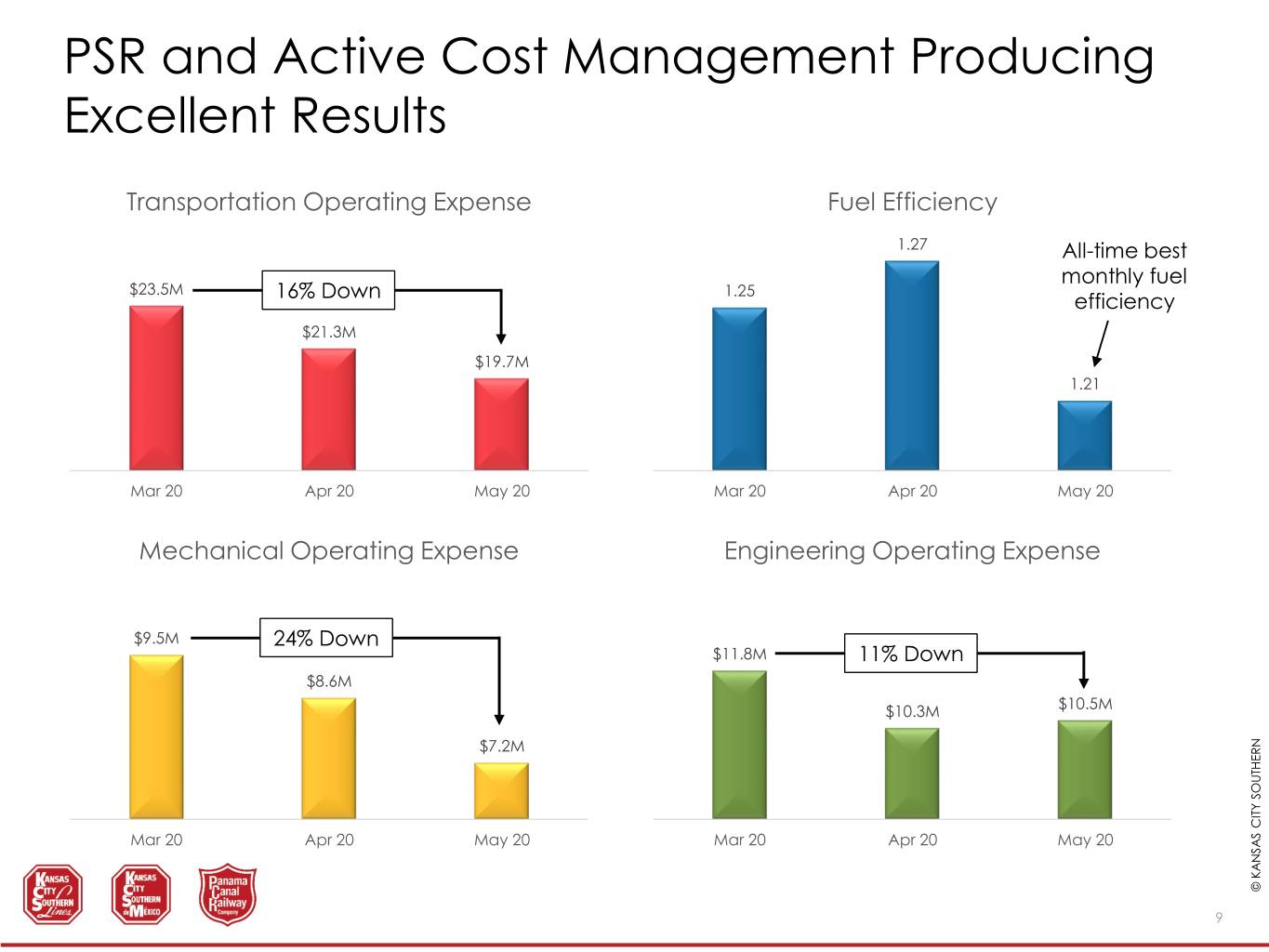
PSR and Active Cost Management Producing Excellent Results Transportation Operating Expense Fuel Efficiency 1.27 All-time best monthly fuel $23.5M 16% Down 1.25 efficiency $21.3M $19.7M 1.21 Mar 20 Apr 20 May 20 Mar 20 Apr 20 May 20 Mechanical Operating Expense Engineering Operating Expense $9.5M 24% Down $11.8M 11% Down $8.6M $10.3M $10.5M $7.2M Mar 20 Apr 20 May 20 Mar 20 Apr 20 May 20 © KANSAS © KANSAS CITY SOUTHERN KCS 9
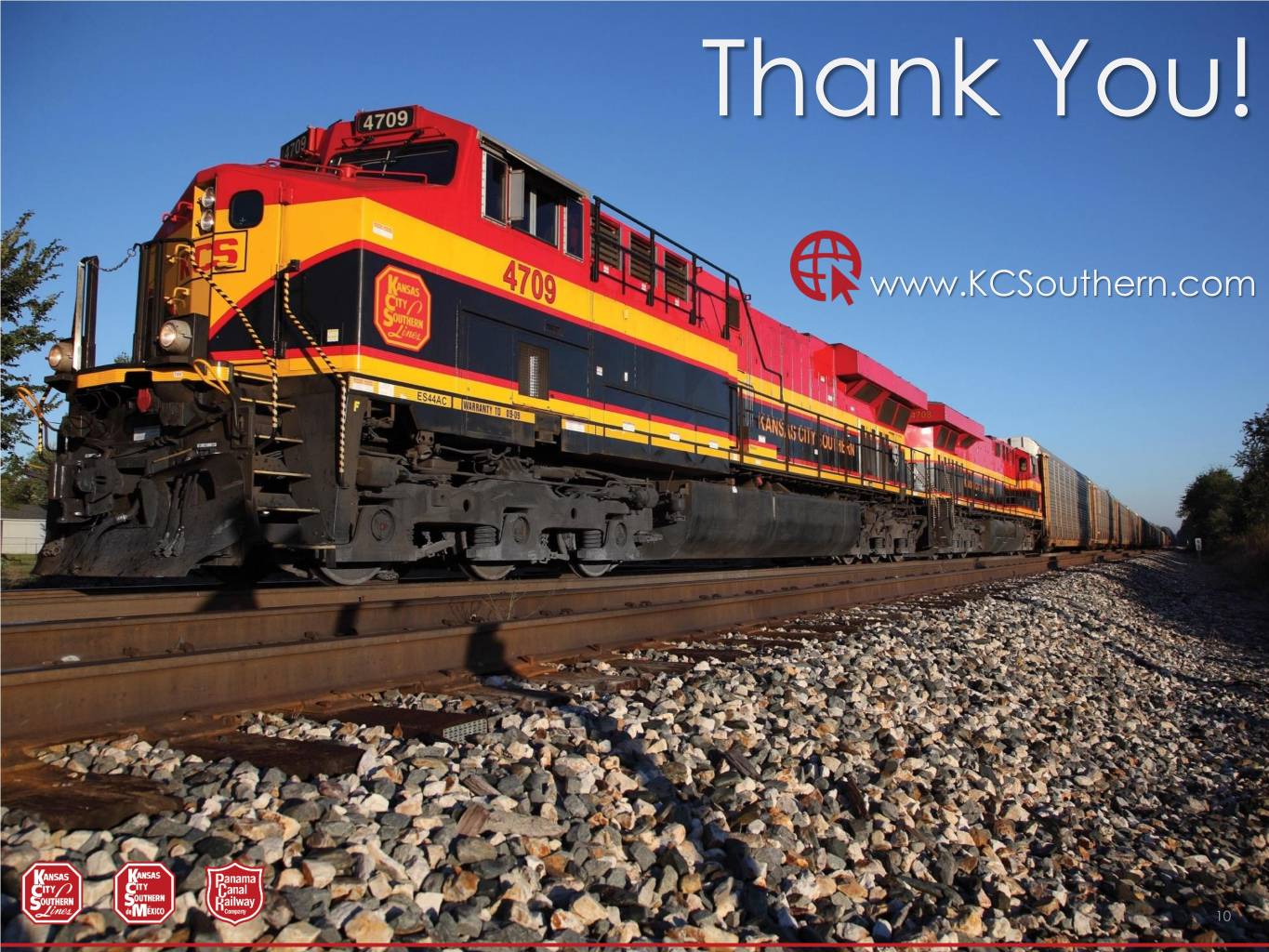
Thank You! www.KCSouthern.com © KANSAS © KANSAS CITY SOUTHERN KCS 10
